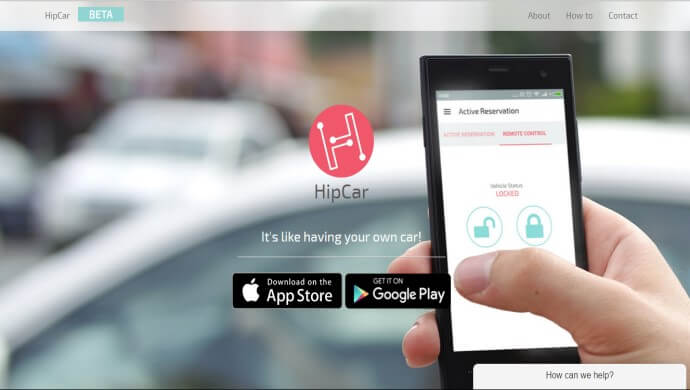Inspired by ZipCar in the US, HipCar is targetting university students in Jakarta as its market

Despite challenges, car-sharing continues to become a hot business in Indonesia, with companies such as Grab even claiming the country as its biggest market.
But Jakarta-based HipCar decides to speed on a different lane by introducing a fully digital self-service car rental service to the public.
“Basically HipCar is an on-demand self-driven car-sharing. It has stations where you can pick up the cars from. Everything is done by a mobile app from registration, top up, unlocking the car door … The car service is available 24/7 so you can just pick it up at one of our stations without having to meet our personnel,” HipCar Founder Leo Tanady explains to e27 over coffee.
He then proceeds to demonstrate how the app works: First users search for cars in three available stations in different areas across West Jakarta –Kemanggisan, Tanjung Duren, and Tarumanegara University. After choosing one of the available cars, users will then get access to Bluetooth-activated virtual ‘car keys’ to unlock the car with.
“Bluetooth is chosen [to anticipate] signal problem, as sometimes when we park in the basement we might not get signals,” Tanady says.
Also Read: Israel’s StoreDot can charge your electric car in 5 minutes
Once the user gets inside the car, he or she can find the ‘real’ car keys inside to start the engine with, and begin using the vehicle.
Though HipCar charges users on hourly basis (which includes fuel, maintenance, and insurance), there is no limit to the duration of the car usage itself. Users can even return the car to a different station than where they picked it up from.
“Just like owning your own car … If you don’t need it, then you can put it back to the station,” Tanady says.
Unlike most ride-sharing companies who partner with conventional car rental services or individuals to provide the cars, HipCar actually owns all the cars in its platform. At the moment they have four in each station, and is targeting to have at least 200 in Jakarta alone by next year.
“We might consider working with a partner in the future but right now [as] we were just being launched for about three months, we want to be able to control the experience, the hardware, and stuff like that,” Tanady says.
“Some partners might not want the hardware to be installed in the car,” he adds.
Also Read: Think self-driving cars will one day solve your traffic problem? Think again
In that case, the next big question will be: How does HipCar make sure that the car comes back?
“Basically the hardware is sort of inclusive of GPS as well, we can actually deactivate the car remotely. We [also] monitor where the car is going as well, so that is the first layer of security,” says Tanady.
“The second layer is, of course, we have car rental insurance,” he adds.
The hardware itself is also completed with a set of security features. For example, in the case where the car is being break into, the perpetrator will not be able to start the engine even when he has the keys inside. Because the ability to start the engine is reserved for the person who had made the booking, as proven through his use of the app to unlock the car.
Security is also one of the reasons why HipCar set up its stations in a university and surrounding areas, thus targeting students as its main audience.
“We are catering to university students first, because they are more tech-savvy and … are still safer than the general public. But eventually we’ll have to open up to the general public,” Tanady explains.
The fully cashless system that HipCar implements is also more suitable for university students.
“But we only have bank transfer for now, because students usually don’t have credit cards,” he says.
Also Read: Chinese authorities hint at green-light for ride-sharing apps; with a major stipulation
HipCar is one of the six Indonesian startups participating in the GnB Accelerator programme. It is currently being run by a very lean team of three, including Tanady himself.
“We try to build a solution with minimum interaction with humans. That way we can also save on the manpower,” he stresses.
Tanady first got the inspiration to start the company when he was doing his Masters in the US, where he had the opportunity to give services such as ZipCar a try.
“So I was looking at how people move around, because the US is so huge and public transportation is not really that good as well, so everybody has a car … Back in Jakarta, public transportation is even way worse than in the US. Taxi is somewhat not affordable if you think of the average salary of Indonesians. Having a car is also expensive. It’s very hard for people with families to get around in public transportation,” he explains further.
“In the long run, my goal is to have [the stations] available in neighbourhoods, so people don’t need to own a car,” he concludes.
In fulfilling this mission, Tanady does not consider other ride-hailing apps as competitors, as they are all aiming for different target audience.
“Uber is good for point-to-point, but when you want to get to multiple destinations, it gets expensive. Our users so far in average have been using our services for at least three hours,” he says.
“We are actually more of a compliment for public transportation,” he closes.
The post This startup aims to introduce self-service car rental to the Indonesian market appeared first on e27.